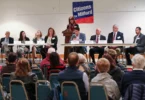(Mouse over graphic for amounts. Totals as of Oct. 4, 2016)
BU News Service
Greater Boston residents contributed more than $13 million to the presidential race, with the overwhelming bulk going to Democratic nominee Hillary Clinton and only sparse pockets of financial support for her Republican opponent Donald Trump, newly analyzed federal election data shows.
Of the nearly 50,000 individual contributors to the race as of October 4, $12,940,152 went to Clinton or Democratic Super PACS, according to data provided to Boston University journalism students from the Center for Responsive Politics, a Washington,D.C.-based nonpartisan campaign finance news site.
In contrast, Trump or Super PACS supporting Trump raised $547,812. Independent nominee Gary Johnson raised $64,590 and Republican Super PACS who did not support Trump were given $3,480 by Greater Boston residents, the data shows.
The numbers support Greater Boston’s long reputation as a thoroughly Democratic city. Out of more than 470,592 registered voters in Suffolk County alone as of last month, nearly 52 percent are registered Democrats with just over six percent registered as Republicans, according to the Massachusetts Secretary of State’s Enrollment Breakdown.
The most generous Greater Boston donors to the presidential race come from Cambridge, Boston and Brookline respectively.
In Brookline, about 2,088 residents gave to Clinton, with just 31, including eight women, contributing to Donald Trump. Clinton reaped $690,352 in campaign cash from Brookline residents compared to Trump’s $4,713, the data shows.
“These numbers certainly speak to the depth of the Clinton campaign in Brookline,” said town selectman Bernard Greene.
Brookline resident Cynthia Pischdotchian, a jewelry business owner, said she was attracted by the area’s reputation. “What drew me to move to Brookline was its reputation as a very diverse town filled with intelligent and successful people who care about political and economic issues,” said Pischdotchian.
In contrast to vocal Boston area supporters of Clinton, numerous Trump supporters contacted for this article either did not respond to requests for comment or would not allow their name to be used. The most generous Back Bay donor to Trump, a 68-year-old lawyer, said he fears backlash over his support of the GOP nominee.
When the world is so volatile, someone familiar with foreign policy decision-making could avoid catastrophic results.
— John Shattuck, former Assistant Secretary of State and U.S. Ambassador to the Czech Republic
Back Bay residents contributed the second largest amount among city donors with $731,607, the data shows.
Peter Sherin, a 76-year-old Beacon Street resident and Clinton donor, said his neighbors’ “higher level of education and their worldliness” separates them from some Trump supporters.
“They don’t live in a town where everyone goes to the same church, has the same gene package and believes exactly the same thing,” Sherin said. Neighborhoods like Back Bay, Sherin said, “have a greater mixture of everything and therefore are more comfortable with difference.”
Trump’s strongest political backing comes from white, non-college educated men, recent polling shows.
Residents in some of the region’s most elite neighborhoods expressed some puzzlement that the candidates did not raise more money from their neighbors. Beacon Hill residents contributed just 2.5 percent of overall contributions, or $344,000 as of Oct. 4, the data shows. Trump was slightly outpaced by Libertarian Party candidate Gary Johnson, who raised $3,250 from Beacon Hill residents to Trump’s $3,043. The rest went to the Clinton campaign, the data shows.
“I am surprised that Beacon Hill does not have a larger representation in the donor base,” said resident Keith Lutz, an online editor at Harvard Law School and a Clinton donor. “There may be some kind of malaise about the election in general, given how divisive and contentious it has become.”
Patricia Tully, president of the Beacon Hill Civic Association, also expressed some surprise at the number of donations from the neighborhood.
“I would expect people to be more engaged politically, as we find that many of the neighborhood residents are very engaged in the community,” Tully said. “And I think this election, in particular, calls for more involvement.”
In other parts of the city, donations were even lower. For instance, Roxbury residents made 174 donations in total, raising roughly $27,131 for the presidential candidates.
Trump received just two donations, reflecting what some residents of this predominantly minority neighborhood feel is his reputation for lacking of support for diversity.
“Many people of color that I know, even if they don’t know much about politics, even if they didn’t understand the debates at all, have this consensus that Trump is racist,” said Taylor Camri, a Boston University senior who grew up in and near Roxbury.
Across the nation and especially in Massachusetts, Trump has been falling short with minority votes, bringing in 17 percent of Latino voters and just 3 percent of African-American voters, according to recent polling.
Malia Lazu, executive director and co-founder of Future Alliance Boston, feels Roxbury residents have other more pressing priorities than contributing cash to a presidential candidate.
“[Roxbury citizens] are more focused on their day-to-day lives. Getting by day to day, surviving day to day and not always thinking long-term because they feel like they can’t,” Lazu said.
North End resident and former diplomat John Shattuck’s $2,700 donation was the largest in his neighborhood, which also gave one of the smaller total amounts to candidates this election cycle. North End residents contributed $21,531 as of Oct. 4, the data shows.
“It was not easy to do. I had to cut back on other things,” said Shattuck, who stressed the high stakes in this particular presidential race. “It’s a very important time for American democracy.”
Shattuck is a former Assistant Secretary of State under President Bill Clinton and a former U.S. Ambassador to the Czech Republic.
“When the world is so volatile, someone familiar with foreign policy decision-making could avoid catastrophic results,” Shattuck said.
Fenway-Kenmore residents donated $35,569 to the race as of October 4, or roughly .5 percent of contributions from Greater Boston, the data shows. All donations went to Clinton with retirees and those working at the area’s many colleges the largest contributors.
Clinton donor and Boston University Professor of Classical Studies Patricia Johnson said she doesn’t think political apathy is behind the low number of donations from the neighborhood compared to other areas of Greater Boston, but instead reflect the Fenway-Kenmore demographics.
There are 32,399 residents living in Kenmore-Fenway, with almost 85 percent of them non-families and with a residential median age of 20, according to a March 2016 Boston Redevelopment Authority Research Division Analysis.
“There’s a lot of young people who have a lot of money to pay for rent. Maybe they’re stretched,” Johnson said.
Clinton donor Elizabeth Reilinger, the co-founder and managing partner of LeadWell Partners, said supporting Clinton was an easy choice.
“Mrs. Clinton is the most qualified nominee we have had in a very long time. She is tough, she is resilient, shows the temperament and the attitude and approach that we want in a president,” Reilinger said.”
This story was produced as part of Boston University Professor Maggie Mulvihill’s Beat Reporting class. Student contributors are: Callie Ahlgrim, Christina Beine, Benjamin Bonadies, Alexis Chestnov, Sam Cote, Priya Dadlani, Samantha Smerechniak and Caroline Statile.







